When the Delhi Gang Rape occurred in December 16, there was uproar. But, it wasn’t the first brutal crime against a woman in this country and it wasn’t even the case that it would be the last. We are riddled in guilt and shame with similar reports coming out time and again even when the Delhi case was tried in a Fast Track Court for about nine months before giving a verdict of guilty and sentencing the convicts to death penalty. This case is far from over yet. The sentence is likely to be appealed in the High Court.
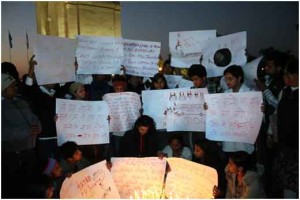
Protesting civilians at the India gate © Ramesh Lalwani, via commons/flicker
The incident in Delhi was different from the others because the government was confronted and many uncomfortable questions were asked. There were protests occurring in this country in every way a common person would possibly do. There were heated discussions in the Parliament. After this the Delhi government announced that the trial of the case will be done is going to be in a Fast Track Court, ensuring speedier justice to the victim.
Fast track courts in India:
Fast track courts were set up first in India in 2001. In the report of Department of Finance, it was stated that the proposed Fast Track courts would dispense long pending Sessions cases and also help with the cases of vast under trial prisoners in the country who languish in court waiting for their case to end, in some cases the number of years the under trial prisoners spend in the courts are more than the maximum punishment they would get if convicted.A fast track case is heard by the court on a day to day basis. These courts were funded by the Central government till the year 2011 after which it stopped the funding. Presently, setting up and functioning of Fast track courts is entirely dependent on the State government and these courts are administered by the High Courts. The numbers of these courts have come down due to financial problems even when the number of cases dispensed by them was high.
Which cases go in Fast track Courts?
There are no guidelines as to particular cases that should be fast tracked. It has been observed that cases that get much media attention are declared to be tried before the fast track courts. Many intellectuals bash up this bias against other cases as it might be against the fundamental right to equality which is guaranteed by our constitution. When a case is fast tracked because of public pressure, the case tends to take more than average time in a Fast Track Court because there is extra caution while performing each step and these is lesser chance of cutting corners. A High Court can declare which case would be tried in a Fast Track Court.
Designating existing courts as fast track courts for special cases:
If the judgement of the gang rape in Delhi comes out in September as expected, it would be be one of the faster cases to be decided as fast tracking a case does not mean dispensing with the system of a criminal procedure, the court hears the case on a day to day basis and there are few adjournments in this process. But this court was drawn from an existing Sessions Court and it does not seem fair to transfer the other cases to the already backlogged system. The cases which are unable to garner such attention are looked at suspicion with the higher courts. It is true that the High Courts are skeptical of the judgments of these courts because of two main reasons; one, that the procedure might not have been followed properly and second, that the ad-hoc judges who are sometimes appointed might not invite confidence from the higher judiciary.
Fast tracking a case is a good method to remove backlogs, but, each of these cases is more than just numbers. There is no codified system to send cases to these courts and this can lead to arbitrariness. Even though the achievements of these courts have been credible and as these courts are also subject to the higher courts, there are proper sanctions to these courts they would work properly only when they are not chalked out of the existing batches of Courts as is done by some states.
Some notable fast track cases:
Best Bakery Case
This case could be one of the examples of how fast tracking a case can have serious repercussions if the procedure and evidence are not taken properly by the court in the beginning of a case. 14 people were burnt alive in one of the post Godhra riots in Gujarat in the city of Vadodara in 2002. The case was tried in a Baroda Fast Track Court No.1 which amidst allegations of faulty procedure acquitted the 21 accused. This trial was just 44 days long. The court blamed the police for not investigating the case properly and also due to the fact that many witnesses retracted their statement in the court. Even the High Court upheld the verdict and it was not till the National Human Rights Commission intervened and petitioned to the Supreme Court that the Re-trial was ordered by the court.
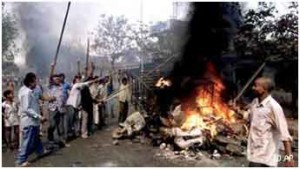
Gujarat Riots- Photo taken from here: Deutsche Welle
When the verdict by the Bombay High Court came in July 2012, upholding life imprisonment of four people and acquitting five, many people were left dissatisfied. Timely investigation is of great essence and due to the lapses in the conduct of the police as well as the Fast Track Court; the Supreme Court observed that there has been gross miscarriage of justice.In a rare instance, the SC had sentenced prime witness Sheikh to one year in prison for perjury in this case.
Jessica Lal Murder Case
When model and part time waitress Jessica Lal was killedby gunshot wound in 1999 in a party in South Delhi, it would have been an easy investigation, but for the fact that the accused was the son of a powerful politician.During the trial the three critical eye witnesses recanted earlier statements made to the police and twenty-nine witnesses of lesser importance did the same. One of theeye witnesses, Shyan Munshi, changed his testimony so completely that hisrevised statement was used as evidence by the defense.
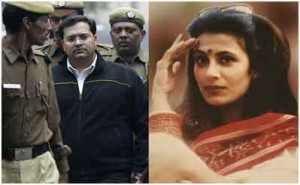
File photos of Manu Sharma and Jessica Lal, Sourced from here:Outlook India
On February 2006, Sharma and other defendants were acquitted leading to a huge outcry. There was petition to the then President as well as the Prime Minister by the public. When the decision of the lower court was appealed, the High Court took the matter urgently and heard the case without allowing many adjournments. Though this is not a case which was Fast Tracked officially, many newspapers reported that the case has been fast tracked, referring to the nature of the events. This case explains why every court can be a fast track court in India and making a special court for controversial cases seems like giving a placebo to angry citizens.
26/11 Mumbai case
When on 26 November, 2008, Ajmal Kasab and nine other gunmen attacked various places in Mumbai killing 166 people; he was the only one who was caught alive by the police. There was overwhelming evidence of his guilt – including CCTV footage of him with the weapon in the CST station, his confession as well as testimony by the people who survived the attack, DNA match with the articles on the vessel hijacked by the terrorists and he was given a fair trial by following the proper mechanism of the judicial system which took some time to reach a verdict.
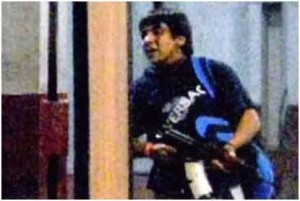
Kasab pictured carrying an automatic rifle as he enters the station- credits AFP: Photo sourced from Radio Australia
The case of Ajmal Kasab, because of the nature of the offence (waging war on the nation, murder of 166 people), was put on Fast Track Court in January, 2009. The prosecution filed a charge sheet running into 11,000 pages. He was charged of at least 86 offences and was found guilty to most of them by the court on May 6, 2010 and sentenced to capital punishment. This case went into appeal to the High Court, then the Supreme Court and a Mercy Petition was applied for and rejected by the President of India. The lone surviving terrorist was hanged four years after the gruesome incident.
Is this course affecting the procedure of natural justice?
One more similarity one would find in all these cases is that in each of them there was extreme pressure on the judiciary as well as the executive to do their job. Each and every document was being followed up by thousands of interested people. Fast Track Courts also have been known to get unrealistic targets as compared to normal judicial process. According to the Department of Justice, “As per the latest available information received from the High Court /State Governments, 32.34 lakh cases have been disposed off by these courts, out of 38.90 lakh transferred to these courts leaving 6.56 lakh cases pending for disposal.” After looking at this data a question comes into mind that how such high numbers are achievable by remaining within the principles of natural justice and whether these speedier disposals are at the cost of bypassing the proper route necessary for both the victim as well as the accused.
The long term problem of delay in deciding the cases can be checked by increasing the number of permanent judges by five times the present number. Senior advocate of the Supreme Court, Mr. Colin Gonzalves has been quoted in the Voice of America as saying that the present number of judges in India is 12 per million people whereas in developing countries, it should be around 60 per million. Fast track courts are Sessions court with improved efficiency. They are a proof that the system can work when it chooses to. By increasing the number of Judges, our country can significantly decrease the chances of ‘delayed justice’ and rebuild the faith in the Indian Judiciary.
 Serato DJ Crack 2025Serato DJ PRO Crack
Serato DJ Crack 2025Serato DJ PRO Crack


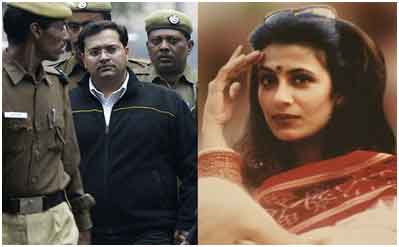







 Allow notifications
Allow notifications



So why the hell they don’t add more judges to the system? Finance doesn’t seem to be an appropriate excuse!!